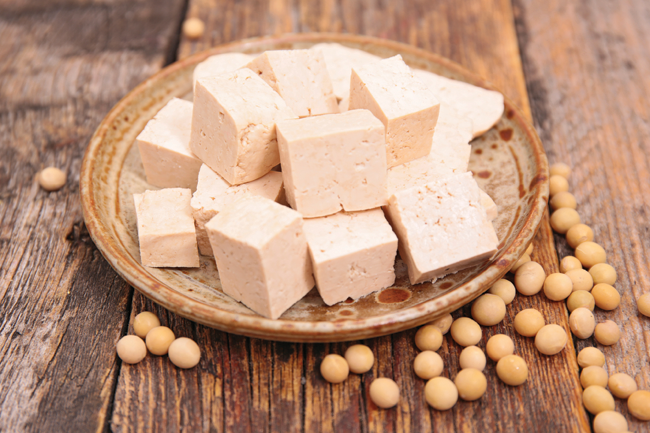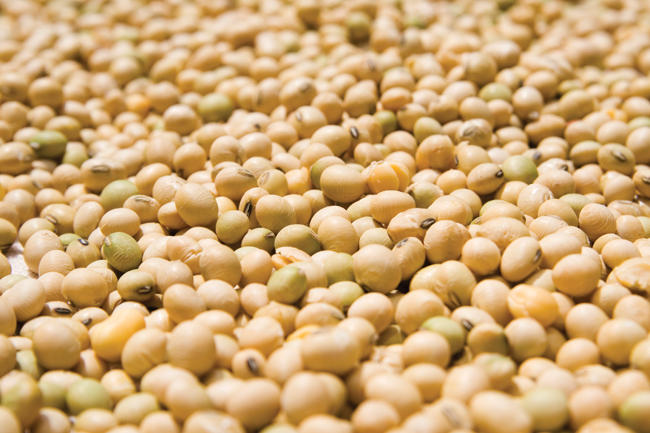Nutritional scientist and blogger at ‘Gluten-Free and All Things Nice’, Michelle Kickham looks into the facts behind soy…

Soy has gotten itself a pretty bad rap nowadays. Nobody really knows what to think about it; is it good for you? Will it help with my hormone problems? Does it cause cancer? It’s understandable, really – why we can’t seem to make our mind up about what’s good for us (kale anyone?) and bad for us (did you just say carbs?). The health food industry is known for throwing around often completely invalidated claims about the relationship between the foods we eat and the illnesses that bestow us. ‘Blueberries prevent cancer!’ is a common one, along with “dairy causes inflammation!’ and, of course ‘soy causes cancer!’ It can get a bit confusing – is there anything left for us to eat, besides raw fruit and vegetables? (Except the dreaded carbohydrate containing vegetables – oh no, none of those!)
Don’t get me wrong, I am very much a ‘health foodie’ and I do appreciate that with good food comes good health, all things being equal. But when are things really equal? All the kale in the world cannot override your genes, environment and the remaining myriad of factors which may contribute to any particular illness – we’ll say cancer, due to its relevance with soy and acclaimed ‘cancer risk’. Sometimes we need to take a step back and look at the facts; because really, how many doctors have you seen prescribe a diet of blueberries to a breast cancer patient? Hopefully not too many. I’m aware I come across as cynical, but I do believe in the health benefits (and detriment) of foods but, as with everything, you need to take it all with a grain of salt. Also, for the record – blueberries do not cure cancer, and carbohydrates will not destroy your pancreases’ ability to produce insulin.
While I could go on about the numerous myths and misconceptions (and the many truths of course – I don’t want to seem like a pessimist here) surrounding the health food industry these days – this article aims to clear up the controversy surrounding the vegan’s best friend; soy.
So, what is soy?
Soybeans are highly nutritious legumes native to Asia, and have become increasingly popular in the West in the last decade. While the bean can be eaten alone, you’re probably used to seeing the soybean in its more processed state (think tofu, soy milk etc). Raw soybeans contain high amounts of phytic acid, which humans cannot break down. Although phytic acid is a powerful antioxidant, its high concentration in soy products can cause digestive issues in some individuals. The process of fermentation reduces the levels of phytic acid and for this reason, is the most popular form of soy eaten.
Why we love it!
Nutrition
Soybeans have a fantastic nutritional profile. They are a complete protein source; that is, they contain adequate amounts of all essential amino acids (the amino acids our bodies cannot make themselves), making them the vegan’s best friend. In addition, they’re a great source of minerals (such as iron, magnesium and zinc) and vitamins (especially B-vitamins – again, making them the vegan’s dream!). They’re also high in fibre and polyunsaturated fats (the ‘good’ fats).

A Vegan’s Best Friend
There are other reasons why vegans and non-meat eaters alike enjoy this bean so much. Soybeans were historically known as ‘meat without bones’ due in part to its nutritional profile, but also its texture. In its fermented form (tofu for example) it mimics both the taste and texture of meat and eggs, depending on how it’s cooked. It can even be used to replace eggs in baking. Textured vegetable protein (TVP), a soy-based product, can be cooked up and served just as any minced meat would.
Hormone Balancing Effects
Soybeans can stimulate the production of proteins involved in a range of biological activities including cognition, growth, immunity and sexual development. Supplementation with soy isoflavones has been shown to reduce the symptoms of menopause in women by 20%, without undesirable adverse effects typically seen with traditional HR therapies. However, there are also studies showing the complete opposite effect!
Immunological and Antioxidant Effects
In addition to providing some well-loved antioxidants, soy also contains small proteins which may aid in immunity and exert anti-microbial activities. Although studies have shown that soy supplementation has a positive effect on the body’s defence mechanisms, the results were not significant and, in my opinion, require more research.

Why we’re sceptical…
I don’t like calling any type of food ‘bad’ – it’s a very negative and close-minded way of thinking, not to mention unhealthy. However, nothing is without its quirks. It’s time to look at why so many of us fear and avoid it, and whether or not this is warranted.
Suspected carcinogen – but is it really?
What would an article about soy be without mentioning cancer? We’ve all heard it – soy causes cancer. As a scientist, I can’t say that it has no impact whatsoever on cancer progression as this is a very complex disease with so many variables, but there is little to no evidence supporting the claim that it does. While there are some studies showing that soy isoflavones stimulate the expression of genes involved in the growth of cancer cells, it is important to note that most of these studies were conducted in mice or in cell culture – not in actual human beings. In fact, recent studies conducted in humans have showed that soy intake may protect against the onset of endometrial cancer, inhibit breast cancer cell growth and reduce the risk of prostate cancer. Confused yet? Well, scientists are too! As it stands, soy appears to be completely safe for human consumption and poses no threat in the development of hormone-associated cancers.
However, due to these mixed results, it is recommended by many professionals to avoid soy if you are suffering from Estrogen-Receptor Positive Breast Cancer, as it can interfere with the actions of common chemotherapy drugs.
Allergens
Soy allergy is one of the most common food allergies in the world, and is predominantly seen in infants and newborns. Though most allergic reactions to soy are mild, acute reactions such as angioedema (swelling of the face and other areas of the body) and anaphylaxis may also occur. Food allergies are annoying, for sure – but we work around them, and eventually get used to it. Soy, however, is extremely hard to avoid (seriously – look at the ingredients list of something in your kitchen – I can almost guarantee you that soy is in there somewhere!). This makes it one of the most difficult food allergies to live with. Fortunately, most children ‘outgrow’ this allergy, but for some, it persists through life.
Flavour
Soy yoghurt and milk have a certain grainy texture and bitter after taste that many people just cannot tolerate. One way of getting around this is by sticking to the fermented and more processed forms such as tofu, miso and tempeh.
Take home message…
Soy is a very nutritious legume with numerous health benefits. Despite the ongoing controversy over soy and cancer, more recent and comprehensive studies show that soy is completely harmless and is not associated with the development or progression of cancer. The only thing I would keep in mind is that soy is a very powerful source of phytoestrogens, and should not be eaten in excess, in order to avoid any unwanted hormonal effects. By all means, enjoy soy – eat it every day if that suits you – but do keep in mind that overdoing it might make you feel a little ‘off’.
 Michelle Kickham is a doctoral candidate in Immunology and Organic Chemistry and a current Irish Research Council scholar. Michelle believes that science holds the power to make a real difference and her goal is to explain the science behind health claims, offer advice and tips, as well as sharing healthy recipes to suit almost any diet.
Michelle Kickham is a doctoral candidate in Immunology and Organic Chemistry and a current Irish Research Council scholar. Michelle believes that science holds the power to make a real difference and her goal is to explain the science behind health claims, offer advice and tips, as well as sharing healthy recipes to suit almost any diet.
For more information, visit www.gfandallthingsnice.wordpress.com
